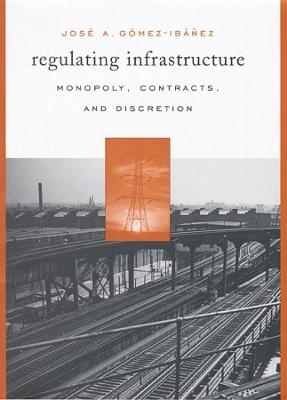
Regulating Infrastructure
Harvard University Press (Verlag)
978-0-674-02238-6 (ISBN)
In the 1980s and ’90s many countries turned to the private sector to provide infrastructure and utilities, such as gas, telephones, and highways—with the idea that market-based incentives would control costs and improve the quality of essential services. But subsequent debacles including the collapse of California’s wholesale electricity market and the bankruptcy of Britain’s largest railroad company have raised troubling questions about privatization. This book addresses one of the most vexing of these: how can government fairly and effectively regulate “natural monopolies”—those infrastructure and utility services whose technologies make competition impractical?
Rather than sticking to economics, José Gómez-Ibáñez draws on history, politics, and a wealth of examples to provide a road map for various approaches to regulation. He makes a strong case for favoring market-oriented and contractual approaches—including private contracts between infrastructure providers and customers as well as concession contracts with the government acting as an intermediary—over those that grant government regulators substantial discretion. Contracts can provide stronger protection for infrastructure customers and suppliers—and greater opportunities to tailor services to their mutual advantage. In some cases, however, the requirements of the firms and their customers are too unpredictable for contracts to work, and alternative schemes may be needed.
José A. Gómez-Ibáñez is Derek C. Bok Professor of Urban Planning and Public Policy, Graduate School of Design and Kennedy School of Government, Harvard University.
Acknowledgments 1. Monopoly as a Contracting Problem 2. The Choice of Regulatory Strategy Part I. Regulatory Politics and Dynamics 3. The Behavior of Regulatory Agencies 4. Capture and Instability: Sri Lankas Buses and U.S. Telephones 5. Incompleteness and Its Consequences: Argentinas Railroads 6. Forestalling Expropriation: Electricity in the Americas Part II. Contract versus Discretionary Regulation 7. The Evolution of Concession Contracts: Municipal Franchises in North America 8. The Rediscovery of Private Contracts: U.S. Railroad and Airline Deregulation--with John R. Meyer 9. Price-Cap Regulation: The British Water Industry Part III. Vertical Unbundling and Regulation 10. The Trade-off in Unbundling: Competition versus Coordination 11. Regulating Coordination: British Railroads 12. Designing Capacity Markets: Electricity in Argentina--with Martin Rodriguez-Pardina 13. The Prospects for Unbundling 14. The Future of Regulation Notes Index
| Erscheint lt. Verlag | 1.10.2006 |
|---|---|
| Zusatzinfo | 7 line illustrations, 29 tables |
| Verlagsort | Cambridge, Mass |
| Sprache | englisch |
| Maße | 146 x 227 mm |
| Themenwelt | Recht / Steuern ► Steuern / Steuerrecht |
| Technik | |
| Wirtschaft ► Volkswirtschaftslehre ► Wirtschaftspolitik | |
| ISBN-10 | 0-674-02238-6 / 0674022386 |
| ISBN-13 | 978-0-674-02238-6 / 9780674022386 |
| Zustand | Neuware |
| Haben Sie eine Frage zum Produkt? |
aus dem Bereich


